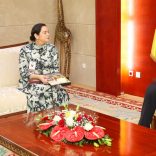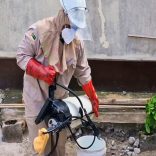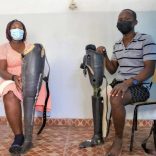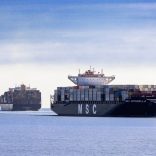Mozambique: President of the Republic encourages expansion of World Vision's actions
OAM demands punishment over hidden debts – AIM report

File photo / Flavio Menete
The chairperson of the Mozambican Bar Association (OAM), Flavio Menete, on Wednesday called for exemplary punishment of those involved in the scandal of the country’s “hidden debts”, should it be proved that any crimes were committed in contracting these debts.
Speaking at the ceremony opening the 2017 judicial year, Menete said the country’s economic situation, caused by such factors as the fall in commodity prices, had been worsened by the “shameful situation” of the hidden debts.
He was referring to loans of over two billion dollars granted by European banks (notably Credit Suisse and VTB of Russia) to three quasi-public, security related companies – Ematum (Mozambique Tuna Company), Proindicus and MAM (Mozambique Asset Management). Since the loans were fully guaranteed by the Mozambican government, they count as part of the country’s debt.
By guaranteeing these loans in 2013 and 2014, the government of the time, headed by President Armando Guebuza, increased the country’s foreign debt burden by 20 per cent. It has subsequently become clear that none of the three companies can pay back the loans.
Menete noted that the guarantees were issued without the authorisation of the country’s parliament, the Assembly of the Republic. “Since there was no transparency in the entire process, including knowledge of how the money was used”, he said, “one can only think of the possibility that it was corrupt”.
He hoped that the company hired to audit Ematum, Proindicus and MAM (the London branch of the US company Kroll) “will do its job professionally, obeying the highest standards of quality, and observing the best practices accepted internationally”.
For its part, the Public Prosecutor’s Office, Menete continued, “should use the available information, in an impartial manner so that, if there is sufficient indication that crimes have been committed, those who committed them, their accomplices and those who covered the crimes up, will be held responsible in an exemplary fashion”.
They should be “prevented from continuing to benefit from the values, goods and rights acquired from this criminal activity, and should be obliged to repay the state for the losses caused. It is time we ended the perception that our justice system is strong against the weak, but weak against the strong”.
He did not name any suspects in particular – but the man who signed the government guarantees, knowing that they violated the 2013 and 2014 budget laws, was the the Finance Minister Manuel Chang. As for President Guebuza himself, last year he told the parliamentary commission of inquiry into the loans that, despite the illegal nature of the guarantees, he had no regrets and would do it again, in the name of “national security”.
Menete also attacked the recent award of a contract by the country’s relief agency, the National Disaster Management Institute (INGC), without a public tender, to the company “Transportes Carlos Mesquita Ltd” (TCM), a company in which Transport Minister Carlos Mesquita has an interest. The Minister is one of the owners of the Mesquita Group, which is the main shareholder in TCM. The TCM contract is worth 20 million meticais (about 292,000 US dollars).
This is not the first time that companies linked to the Minister have been accused of receiving undue benefits. “What are the interests that guide governance?”, asked Menete. “What criteria were used to grant benefits to these companies?”
He thought the Law on Public Probity, which was intended to prevent such conflicts of interest, “is being grossly violated. These situations must be halted”.
Turning to the damage caused by cyclone Dineo, which hit the southern province of Inhambane on 16 February, Menete noted that in areas that are prone to natural disasters, schools and other public infrastructure “should be built with characteristics that allow them to resist”.
But that was not the case in Inhambane, and Menete suspected that contractors had taken short cuts and broken the law. “Were those schools built taking disasters into account? Was there inspection? Were the materials used of the quality required for buildings of this nature, considering that they are in areas where cyclones may occur? What engineering measures were taken to protect roads that suffer from rains, and almost always in the same places?”
“Taxpayers and future generations cannot continue to be sacrificed because the law is being broken, which leads us to pay several times for repairing the same infrastructures”, he declared.













Leave a Reply
Be the First to Comment!
You must be logged in to post a comment.
You must be logged in to post a comment.